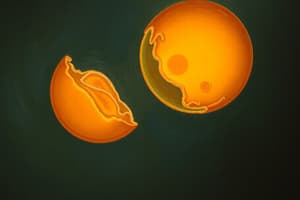Podcast
Questions and Answers
What is the significance of the timing of ovulation in humans for successful fertilization?
What is the significance of the timing of ovulation in humans for successful fertilization?
- Early ovulation is ideal for successful fertilization.
- It has no impact on the success of fertilization.
- Late ovulation increases the chances of fertilization.
- Early or late ovulation decreases the chance of sperm meeting the ovum. (correct)
How does age affect the success of fertilization in both males and females?
How does age affect the success of fertilization in both males and females?
- Younger individuals have a lower chance of successful fertilization.
- Age has no impact on the fertility of gametes.
- Fertility increases with age in both males and females.
- Fertility declines with age in both males and females. (correct)
Which factor can influence the survival and function of sperm and ova within the reproductive tract?
Which factor can influence the survival and function of sperm and ova within the reproductive tract?
- Environmental factors like pH levels (correct)
- Health conditions
- Genetic factors
- Age
What happens when a sperm and an ovum combine during fertilization?
What happens when a sperm and an ovum combine during fertilization?
How do mutations in genes related to reproduction impact fertilization?
How do mutations in genes related to reproduction impact fertilization?
What is the first cell of a new organism formed during fertilization called?
What is the first cell of a new organism formed during fertilization called?
What is the first step in fertilization?
What is the first step in fertilization?
Where are gametes released in humans?
Where are gametes released in humans?
What is the role of fertilization in the growth and development of new life?
What is the role of fertilization in the growth and development of new life?
Which stage of fertilization involves the transportation of gametes to the site of fertilization?
Which stage of fertilization involves the transportation of gametes to the site of fertilization?
What ensures the continuation of species in sexual reproduction?
What ensures the continuation of species in sexual reproduction?
When does the release of ova typically occur in females?
When does the release of ova typically occur in females?
Flashcards are hidden until you start studying
Study Notes
Reproduction: Fertilization
Overview
Reproduction is a fundamental biological process that involves the production of offspring by organisms. This process can occur through sexual or asexual methods. In the context of this article, we will focus on sexual reproduction and the subtopic of fertilization.
Fertilization is the process by which the genetic material of two organisms, usually from different individuals, is combined to form a new organism. This process is crucial for the continuation of species and is essential for the growth and development of new life. In this article, we will explore the key aspects of fertilization, including the processes involved, the importance of timing, and the role of various factors in the success of fertilization.
Processes Involved in Fertilization
Fertilization occurs in several stages:
-
Gamete Production: The first step in fertilization is the production of gametes, which are the reproductive cells that carry genetic information. In humans and many other organisms, this involves the production of sperm (male gametes) and ova (female gametes).
-
Gamete Release: Once the gametes are produced, they are released from their respective reproductive organs. In humans, sperm is released during ejaculation, while ova are released during ovulation.
-
Gamete Transport: After release, the gametes are transported to the site of fertilization. In the case of humans, sperm is transported through the female reproductive tract towards the site of ovulation, where the ovum is released.
-
Fertilization: The sperm and ovum combine to form a zygote, which is the first cell of the new organism. This fusion of genetic material from the two gametes forms a diploid cell, containing two sets of chromosomes.
Importance of Timing
The success of fertilization depends heavily on the timing of the processes involved. In humans, for example, the timing of ovulation is crucial for successful fertilization. If the ovum is released too early or too late, the chance of sperm meeting it decreases, leading to a lower chance of fertilization and conception.
Factors Affecting Fertilization
Several factors can influence the success of fertilization. These include:
- Environmental Factors: Conditions within the reproductive tract, such as pH levels, can affect the survival and function of sperm and ova.
- Genetic Factors: Mutations in genes involved in reproduction can affect the ability of gametes to function properly, leading to a lower chance of successful fertilization.
- Age: The fertility of both males and females declines with age, which can affect the success of fertilization.
- Health Conditions: Certain health conditions can affect the production or function of gametes, leading to a lower chance of successful fertilization.
Conclusion
Fertilization is a crucial process in reproduction, involving the fusion of genetic material from two gametes to form a new organism. The success of this process is dependent on various factors, including the timing of gamete release and the influence of environmental, genetic, and age-related factors. Understanding these processes and factors can help in the development of improved reproductive technologies and treatments for infertility.
Studying That Suits You
Use AI to generate personalized quizzes and flashcards to suit your learning preferences.





